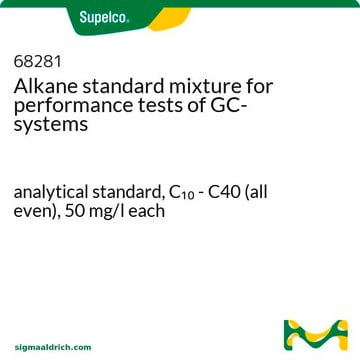69478
N-Methyl-N-(trimethylsilyl)trifluoroacetamide with 1% trimethylchlorosilane
with 1% trimethylchlorosilane, for GC derivatization, LiChropur™
About This Item
Recommended Products
product name
N-Methyl-N-(trimethylsilyl)trifluoroacetamide with 1% trimethylchlorosilane, for GC derivatization, LiChropur™
Quality Level
grade
for GC derivatization
Assay
≥97.0%
form
liquid
quality
LiChropur™
reaction suitability
reagent type: derivatization reagent
reaction type: Silylations
technique(s)
gas chromatography (GC): suitable
refractive index
n20/D 1.378
SMILES string
CN(C(=O)C(F)(F)F)[Si](C)(C)C
InChI
1S/C6H12F3NOSi/c1-10(12(2,3)4)5(11)6(7,8)9/h1-4H3
InChI key
MSPCIZMDDUQPGJ-UHFFFAOYSA-N
General description
Application
Legal Information
related product
Signal Word
Warning
Hazard Statements
Precautionary Statements
Hazard Classifications
Eye Irrit. 2 - Flam. Liq. 3 - Skin Irrit. 2 - STOT SE 3
Target Organs
Respiratory system
Storage Class Code
3 - Flammable liquids
WGK
WGK 3
Flash Point(F)
78.8 °F - closed cup
Flash Point(C)
26 °C - closed cup
Personal Protective Equipment
Choose from one of the most recent versions:
Already Own This Product?
Find documentation for the products that you have recently purchased in the Document Library.
Customers Also Viewed
Articles
Results of a study involving the ability few Fluka silylating reagents to form GC-MS-compatible trimethylsilylmethyl derivatives of NSAIDs
Results of a study involving the ability few Fluka silylating reagents to form GC-MS-compatible trimethylsilylmethyl derivatives of NSAIDs
Results of a study involving the ability few Fluka silylating reagents to form GC-MS-compatible trimethylsilylmethyl derivatives of NSAIDs
Results of a study involving the ability few Fluka silylating reagents to form GC-MS-compatible trimethylsilylmethyl derivatives of NSAIDs
Our team of scientists has experience in all areas of research including Life Science, Material Science, Chemical Synthesis, Chromatography, Analytical and many others.
Contact Technical Service









